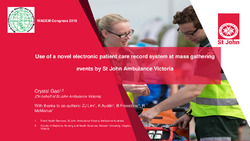Please use this identifier to cite or link to this item:
http://hdl.handle.net/11054/1429| Title: | Assessing the efficacy of a one-day structured induction program in orienting clinical staff to a novel prehospital medical deployment model. |
| Author: | Gao, C. Lim, Zheng J. Yeh, S. Santinon, S. De Haas, S. Austin, K. |
| Issue Date: | 2019 |
| Conference Name: | World Association for Disaster and Emergency Management (WADEM) Congress on Disaster and Emergency Medicine |
| Conference Date: | 7 - 10 May |
| Conference Place: | Brisbane, Australia |
| Abstract: | Introduction: St. John Ambulance Victoria provides first aid and medical services at a variety of mass gathering events (MGEs) throughout Victoria. Volunteer healthcare professionals and students (termed “volunteers”) form Medical Assistance Teams (MAT) at these MGEs. MAT deployments manage a variety of patient presentations which include critically ill patients. This reduces high acuity patient transfers to the hospital and, where possible, avoid ambulance and hospital utilization. Aim: To determine the effectiveness of interdisciplinary prehospital simulation workshops in preparing volunteers for MAT deployment at MGEs. Methods: A one-day, simulation-based training session within the MAT environment was implemented to introduce volunteers to the management of various scenarios faced at MGEs. All volunteers were provided an orientation to the equipment and setting up MAT deployments at MGEs. Volunteers then participated in interdisciplinary group-based scenarios such as cardiac arrest management, drug intoxication, spinal injuries, agitated patients, and airway management. To determine the effectiveness of this training session, volunteers were invited to participate in a post-training survey, comprising of Likert scores and open-ended responses. Results: Seventeen volunteers attended the training session with 10 (58.8%) completing the post-training survey. Volunteers were satisfied with environment familiarization in the MAT (Average 4.47/5.00) and found the simulation-based training helpful (Average 3.67/4.00). The induction overall was well-received (4.60/5.00) with volunteers feeling more confident in being deployed at MGEs (4.20/5.00). Discussion: The results of the simulation-based training session were positive with volunteers receptive to the need for a training day prior to MAT deployment at MGEs. The simulation session enables volunteers to be comfortable with working in MAT and managing a diverse range of patients at MGEs. This session is likely to improve interdisciplinary communication and teamwork in the MAT. Future research is aimed at following these volunteers after several MAT deployments to improve the training session for future participants. |
| URI: | http://hdl.handle.net/11054/1429 |
| DOI: | https://doi.org/10.1017/S1049023X19002127 |
| Internal ID Number: | 01363 |
| Health Subject: | MEDICAL ASSISTANCE TEAMS MASS GATHERING EVENTS SIMULATION-BASED TRAINING INTERDISCIPLINARY COMMUNICATION TEAMWORK |
| Type: | Conference Poster |
| Appears in Collections: | Research Output |
Files in This Item:
| File | Description | Size | Format | |
|---|---|---|---|---|
| WADEM_ePCRSJAV.pdf | Poster | 1.17 MB | Adobe PDF |  View/Open |
Items in DSpace are protected by copyright, with all rights reserved, unless otherwise indicated.
